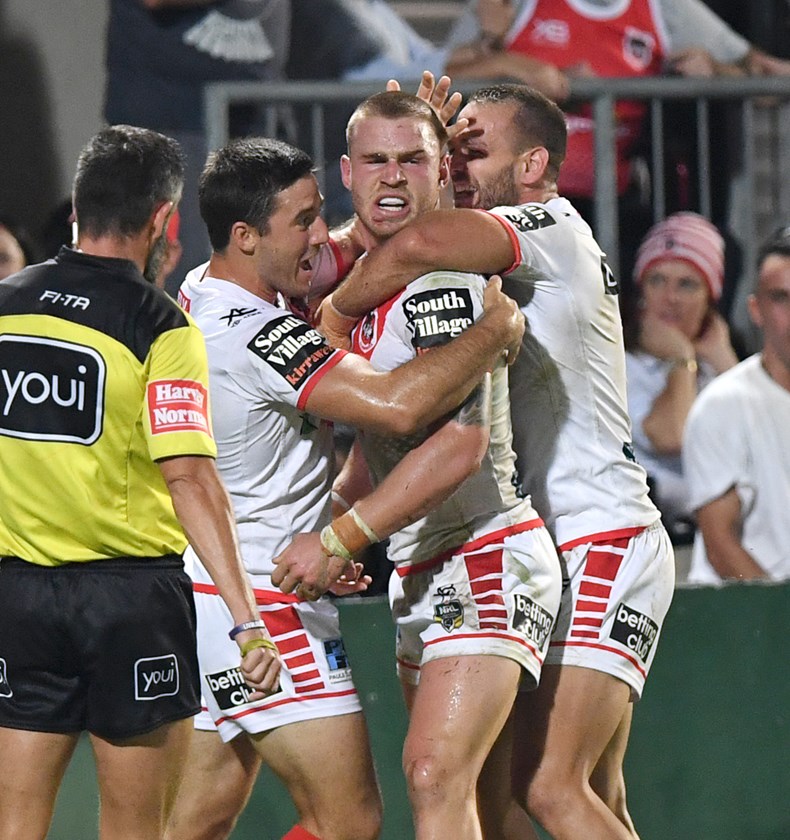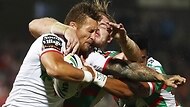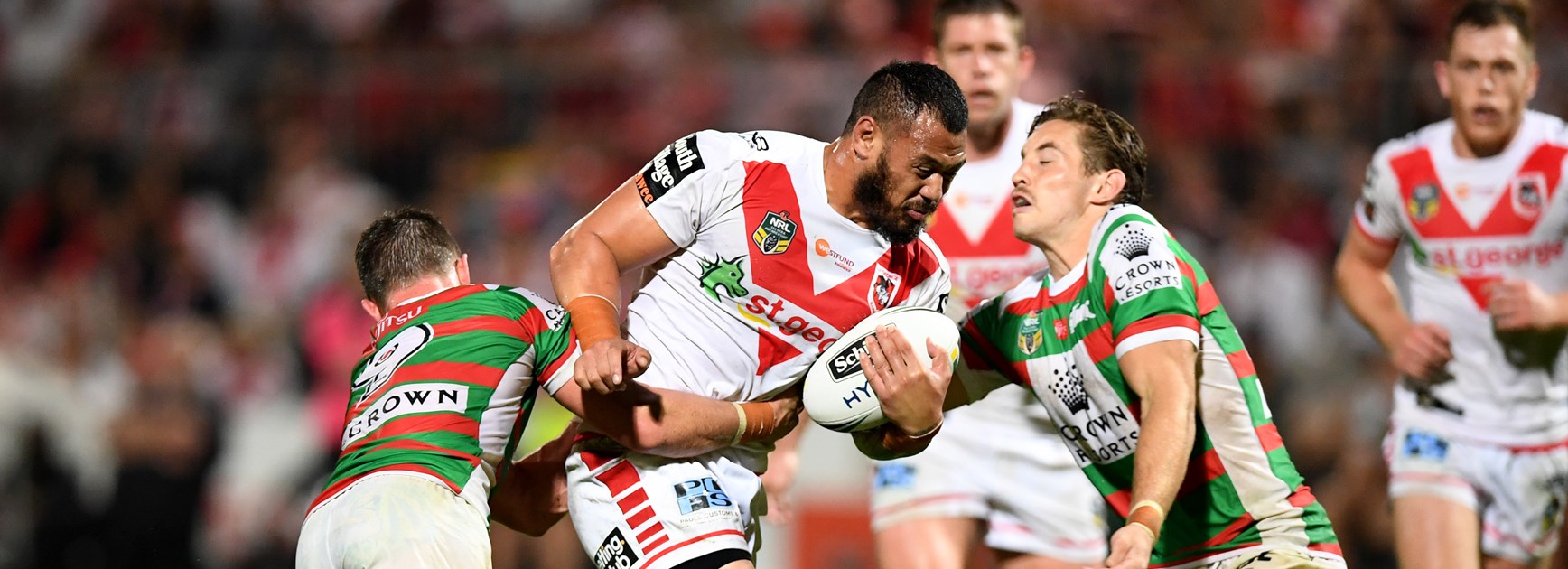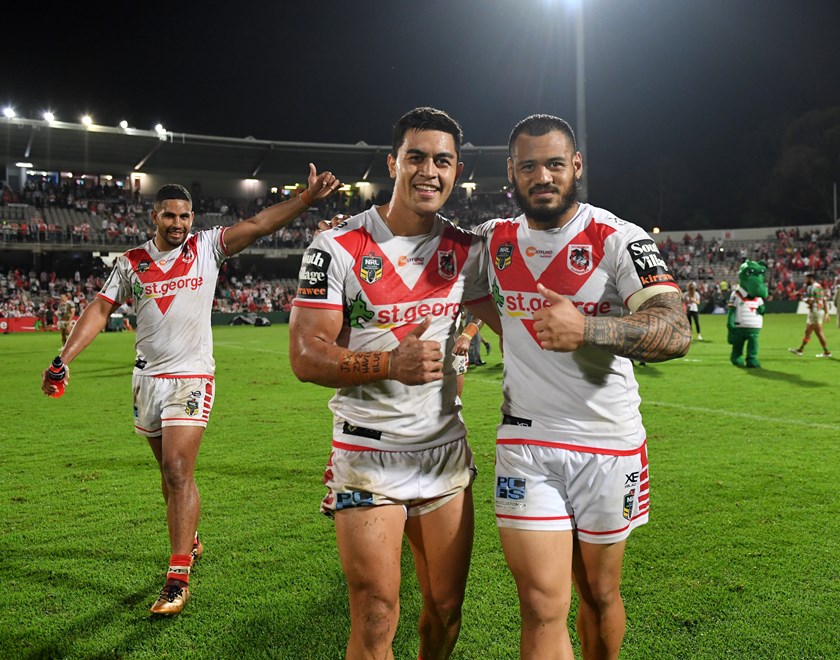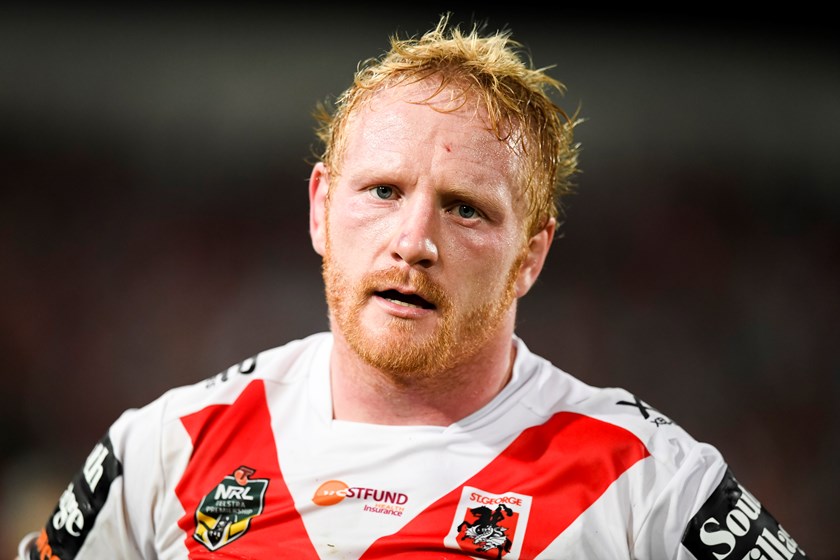True_Believer
Juniors
- Messages
- 1,852
https://www.dailytelegraph.com.au/s...s/news-story/f5d2ebbd81b977e9cb11b03caf78b226
GONE are the days when an NRL coach can march into a press conference and say: “If these blokes don’t aim up, I am going to drop them.”
The simple fact is the salary cap doesn’t allow it, which is why responsibility must be shared from the top down. For failure and success.
It brings us to the team sitting on top of the NRL ladder.
Ben Hunt has made one hell of a difference at St George Illawarra. But just like blaming players after a loss, don’t be fooled into thinking this is all Hunt’s doing.
Remember, the Dragons have the least amount of third-party agreements of any club, giving up almost a $2 million advantage to some.
But they still managed to beat Brisbane and sign Hunt to partner Gareth Widdop in the halves while keeping a quality overall roster that is now the envy of many.
How? What you see now is the result of meticulous planning and stringent salary-cap management.
When Dragons coach Paul McGregor came out before the season and said “this is the best squad I have coached”, many thought it as a dangerous comment.
“He was putting himself on the line saying that,” Dragons head of recruitment Ian Millward agreed.
“But he was also being really honest.
“It’s taken a while and a lot of good people in the organisation to buy into how our recruitment works.
“The coach has got to buy into it. Our CEO is driving it. Our football manager is a vital part. And our CFO is a real key.”
This is the process that leads to success.
It’s no secret the Dragons needed a top-class halfback and when Hunt signed, many believed they paid too much.
“But we had a criteria,” Millward explained.
“We wanted someone who had played 100-plus games. Someone who had played a grand final. Someone who had played Origin or Test football. Someone who came with a real presence, a genuine halfback who could manage a team.
“Twelve months before, we’d gone down to see Cooper Cronk, myself and Mary.
“(Cronk) was very honest. He said he was eventually going to be moving to Sydney but he didn’t know when.
“So we knew we had to move on in the marketplace.”
Importantly, they also knew their budget.
Chief financial officer Jamie Barrington arrived at the club seven years ago and since then, the Dragons have not once spent over the cap.
Before joining the Dragons, Barrington worked at the players’ union, so has a complete understanding of how the cap can be manoeuvred while still playing within the rules.
You’d be surprised how many clubs constantly stuff this up. Then again, maybe you wouldn’t, given how many get caught out.
“There is so many things you can do if you have got the best CFO,” Millward said.
“And when all the numbers are crunched, he says, ‘Well, this is the max we can go’.
“The CFO is working in conjunction with you, saying, ‘We can’t get to 2020 and say we have got no money left but we have only got 14 players. We are in shit now’.”
It’s a fine line.
Overspend in one area and you have to take short cuts in another.
That’s where many clubs gets themselves in strife, and ultimately end up blaming the players.
“The game is getting so tough, you have to hold your nerve in recruitment,” Millward said.
“If you become reactive you will get inconsistent results.
“Sometimes fans want a quick fix. But you can’t run a club that way. We’re constantly looking at the big picture.
“If the coach or the board ever ask us can we look at your succession plans for under 16s, 18s, 20s NSW Cup and first grade, we can get out the paperwork tomorrow and show them.
“Now, it doesn’t always turn out how you want, but our key is the process and the planning.”
Which is how it worked throughout the entire Hunt deal — from the very first phone call to Hunt’s agent, Col Davis, in late September 2016.
Millward and football manager Ben Haran flew to Brisbane twice before Hunt and his partner Bridget came to Wollongong to meet McGregor.
Not long after, Hunt’s agent was back on the phone.
Millward still recalls the conversation: “He basically said to me, ‘There are four B’s in the Hunt family. There is Ben, Bridget, (their toddler) Brady and the Broncos. We are going to drop one of the B’s off. He’s going to become a Dragon’.”
Millward and Haran returned to Brisbane. For two days they finalised every detail before Hunt toasted the deal.
Millward got straight on the phone to McGregor and chief executive Peter Doust. “They were over the moon.”
Just like the fans were last Sunday as the Dragons continued their march. “I really enjoyed the game, but your mind is always ticking,” Millward said. “2019. 2020. 2021 ...
“We are not always going to get it right. But we feel if we take our time as a group, you are giving yourself the best chance to get it right.”
GONE are the days when an NRL coach can march into a press conference and say: “If these blokes don’t aim up, I am going to drop them.”
The simple fact is the salary cap doesn’t allow it, which is why responsibility must be shared from the top down. For failure and success.
It brings us to the team sitting on top of the NRL ladder.
Ben Hunt has made one hell of a difference at St George Illawarra. But just like blaming players after a loss, don’t be fooled into thinking this is all Hunt’s doing.
Remember, the Dragons have the least amount of third-party agreements of any club, giving up almost a $2 million advantage to some.
But they still managed to beat Brisbane and sign Hunt to partner Gareth Widdop in the halves while keeping a quality overall roster that is now the envy of many.
How? What you see now is the result of meticulous planning and stringent salary-cap management.
When Dragons coach Paul McGregor came out before the season and said “this is the best squad I have coached”, many thought it as a dangerous comment.
“He was putting himself on the line saying that,” Dragons head of recruitment Ian Millward agreed.
“But he was also being really honest.
“It’s taken a while and a lot of good people in the organisation to buy into how our recruitment works.
“The coach has got to buy into it. Our CEO is driving it. Our football manager is a vital part. And our CFO is a real key.”
This is the process that leads to success.
It’s no secret the Dragons needed a top-class halfback and when Hunt signed, many believed they paid too much.
“But we had a criteria,” Millward explained.
“We wanted someone who had played 100-plus games. Someone who had played a grand final. Someone who had played Origin or Test football. Someone who came with a real presence, a genuine halfback who could manage a team.
“Twelve months before, we’d gone down to see Cooper Cronk, myself and Mary.
“(Cronk) was very honest. He said he was eventually going to be moving to Sydney but he didn’t know when.
“So we knew we had to move on in the marketplace.”
Importantly, they also knew their budget.
Chief financial officer Jamie Barrington arrived at the club seven years ago and since then, the Dragons have not once spent over the cap.
Before joining the Dragons, Barrington worked at the players’ union, so has a complete understanding of how the cap can be manoeuvred while still playing within the rules.
You’d be surprised how many clubs constantly stuff this up. Then again, maybe you wouldn’t, given how many get caught out.
“There is so many things you can do if you have got the best CFO,” Millward said.
“And when all the numbers are crunched, he says, ‘Well, this is the max we can go’.
“The CFO is working in conjunction with you, saying, ‘We can’t get to 2020 and say we have got no money left but we have only got 14 players. We are in shit now’.”
It’s a fine line.
Overspend in one area and you have to take short cuts in another.
That’s where many clubs gets themselves in strife, and ultimately end up blaming the players.
“The game is getting so tough, you have to hold your nerve in recruitment,” Millward said.
“If you become reactive you will get inconsistent results.
“Sometimes fans want a quick fix. But you can’t run a club that way. We’re constantly looking at the big picture.
“If the coach or the board ever ask us can we look at your succession plans for under 16s, 18s, 20s NSW Cup and first grade, we can get out the paperwork tomorrow and show them.
“Now, it doesn’t always turn out how you want, but our key is the process and the planning.”
Which is how it worked throughout the entire Hunt deal — from the very first phone call to Hunt’s agent, Col Davis, in late September 2016.
Millward and football manager Ben Haran flew to Brisbane twice before Hunt and his partner Bridget came to Wollongong to meet McGregor.
Not long after, Hunt’s agent was back on the phone.
Millward still recalls the conversation: “He basically said to me, ‘There are four B’s in the Hunt family. There is Ben, Bridget, (their toddler) Brady and the Broncos. We are going to drop one of the B’s off. He’s going to become a Dragon’.”
Millward and Haran returned to Brisbane. For two days they finalised every detail before Hunt toasted the deal.
Millward got straight on the phone to McGregor and chief executive Peter Doust. “They were over the moon.”
Just like the fans were last Sunday as the Dragons continued their march. “I really enjoyed the game, but your mind is always ticking,” Millward said. “2019. 2020. 2021 ...
“We are not always going to get it right. But we feel if we take our time as a group, you are giving yourself the best chance to get it right.”









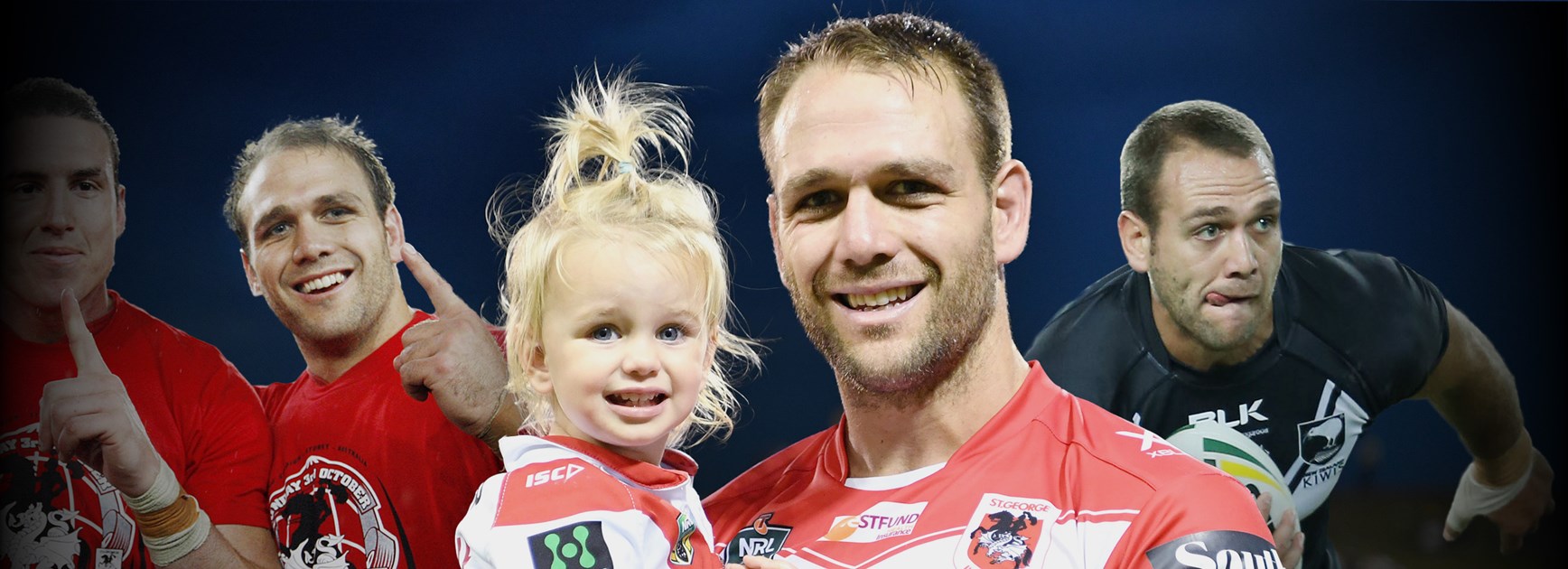
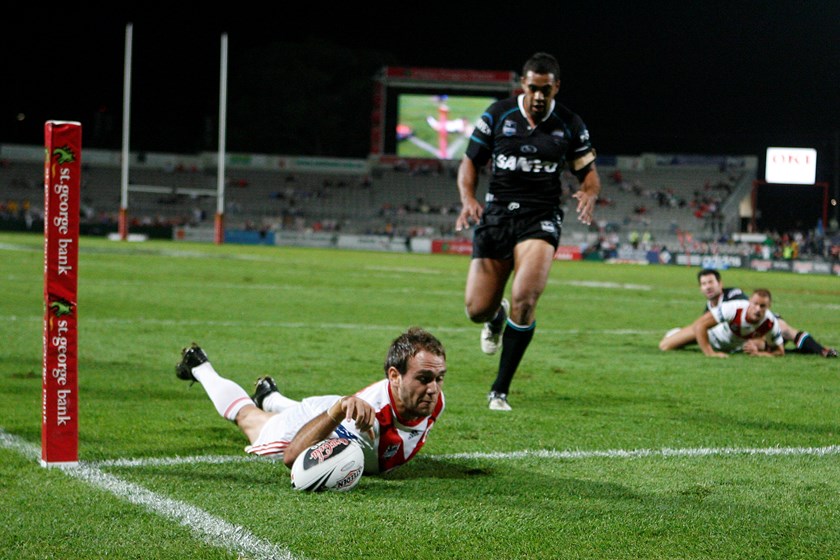
 NRL Photos
NRL Photos
